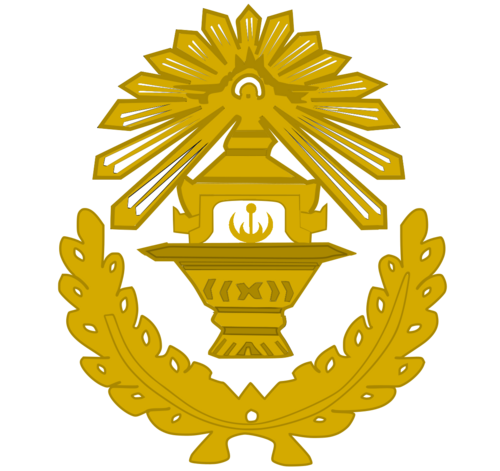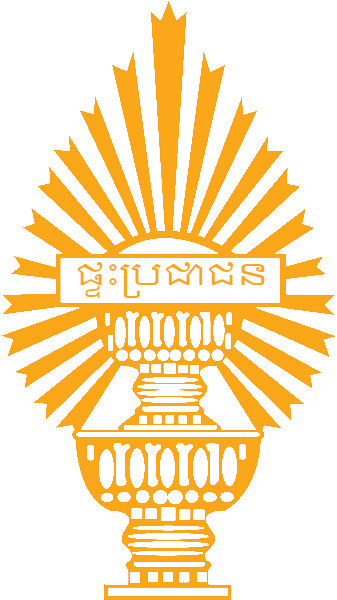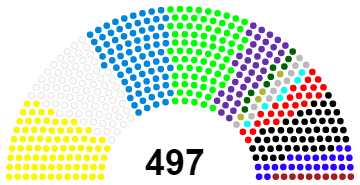Prei Meas Government
Government of Prei Meas រដ្ឋាភិបាលនៃព្រៃមាស | |
|---|---|
 Government Seal | |
| Polity type | Constitutional Parliamentary Nokor |
| Constitution | 1976 Constitution of 3rd Nokor of Prei Meas |
| Legislative branch | |
| Name | រដ្ឋសភាជាតិ |
| Type | Bicameral |
| Meeting place | អគាររដ្ឋសភា (Tikrongmeas) |
| Upper house | |
| Name | ព្រឹទ្ធសភា |
| Presiding officer | Aok Darareaksmey (PMCP}, ប្រធានព្រឹទ្ធសភា |
| Lower house | |
| Name | ផ្ទះប្រជាជន |
| Presiding officer | Sok Mau (PMCP), ប្រធានសភាប្រជាជន |
| Executive branch | |
| Head of State | |
| Title | ស្តេច |
| Currently | Chantuo IV Sisowath |
| Head of Government | |
| Title | នាយករដ្ឋមន្ត្រី |
| Currently | Youis Visothrith (PMCP) |
| Cabinet | |
| Name | ទីស្តីការគណៈរដ្ឋមន្ត្រី |
| Current cabinet | គណៈរដ្ឋមន្ត្រីវិសុទ្ធិរិទ្ធ |
| Leader | Youis Visothrith (PMCP) |
| Deputy leader | Jay Piseth (KRP) |
| Appointer | The Prime Minister |
| Ministries | 21 |
| Judicial branch | |
| Name | សាខាយុត្តិធម៌ |
| តុលាការកំពូល | |
| Chief judge | Dul Samnang |
The Preimeai Government (Preimeai: រដ្ឋាភិបាលនៃព្រៃមាស) officially the Government of Prei Meas consists of 3 branches, the Parliament, the Justice Branch, and the ste ch and prime minister forming an executive branch.
Government Structure
- Executive branch
- Ste ch
- Prime Minister
- Ministry of Human and civil services
- Ministry of Foreign Affairs
- Ministry of Information and Communication
- Ministry of Natural Conservation
- Ministry of Intersekidean Activities
- Ministry of Defense
- Ministry of Fishing and Hunting
- Ministry of Civil Security
- Ministry of Drug and Food Purity
- Ministry of Khaet Affairs
- Ministry of Border Security
- Ministry of Education
- Ministry of Housing
- Ministry of National Parks
- Ministry of Energy
- Ministry of Trade and Comerce
- Ministry of Veteran Affairs and Wellbeing
- Ministry of National Parks
- Ministry of Forests
- Ministry of Lake Pakachok Preservation
- Ministry of Cultural Affairs
- Ministry of Autonomy Affairs
- Bicameral National Parliament
- Judiciary
- Supreme court (officially subservient to the Sekidean High Court)
- Diplomacy
Political Parties and Movements
According to Article 2 Section H of the Prei Meas constitution everyone has the constitutional right to establish and join any political party they wish with only the old Kraham party being banned by the constitution. The last Prei Meas People's House election formed a People's house consisting of 13 parties and the current Visothrith Government consists of 7 of these parties. The Political Parties in the current Government are as follows:
| Ideology | Name | Seats in People's House | Seats in Senate | Acronym |
|---|---|---|---|---|
| Center Right and socially conservative | Prei Meas Conservative Party | 81 / 497
|
6 / 36
|
PMCP |
| Center Left Populist anti corruption, White Politics | White Party | 76 / 497
|
4 / 36
|
WP |
| Conservative Kammist party | Kammist Revival Party | 79 / 497
|
5 / 36
|
KRP |
| Pure Centrism and patriotism | Green and Yellow Party | 81 / 497
|
5 / 36
|
GYP |
| Socially Conservative and Pro strengthened Nokor government and reversal of Khaet devolution | Fatherland | 40 / 497
|
3 / 36
|
F |
| green politics | Green Party | 9 / 497
|
3 / 36
|
GP |
| Phauic Unity and autonomy | Phauic Federal Party | 4 / 497
|
0 / 36
|
P̐TṪ |
| Phau autonomy and progressivism | Phau Liberal Party | 11 / 497
|
2 / 36
|
P̐TT |
| Minean Autonomy | Minean Coalition | 6 / 497
|
1 / 36
|
MC |
| Social Democratic and politcally far left | Party of Social Reform | 25 / 497
|
4 / 36
|
PSR |
| Pirate Politics | Pirate Party | 51 / 497
|
2 / 36
|
PP |
| Individual Autonomy, Laissez-faire, and Libertarian | Free party | 24 / 497
|
1 / 36
|
FP |
| Pro Sekidean federalism | Sekidean Unity Coalition | 10 / 497
|
0 / 36
|
SUC |

Governmental coalition is highlighted in black
Current Coalition
The Current coalition consists of the following parties: The Prei Meas Conservative Party, the Kammist Revival Party, Fatherland, the Phau Liberal Party, the Minean Coalition, The Free Party, and the Sekidean Unity Coalition.
Elections
Timing of Elections
Prime Minister: 4 years during general election
People's House: 4 years with general election (mps can be appointed or replaced by parties at any time)
Senate: Every 4 years during general elections with some Khaet having their elections more frequently
Process of Elections
Voting is typically held for a 48 hour period on December 20th and December 21st of the year for nation wide elections and the two days are national holidays with work and school canceled. Polling can occur at any government building including public schools where people will be presented with a ballot after verifying their ID where they will be able to vote for all relevant positions and items being voted on for that election. All polling locations are by law required to provide security and confidentiality for all voters voting there and their votes. The Vote counting is to be carried out in each Krong and its surrounding area before being sent to Khaet governments to be compiled and finally to the Tikrongmeas Election Agency for fair impartial vote counting with victors announced on the 2nd of January and sworn in the 5th. During the whole vote counting procedures observers are encouraged and required to watch the counting to ensure a fair count at every level and if any foul play is discovered in the counting or election process the guilty party can expect a sentence of up to 2 years in Nokor prison with a ᕋ5,000 fine and the votes that have been rendered invalid will be recounted and if necessary the citizens and permanent residents of the area affected will be invited to participate in a second vote.
Early Voting
Ever since the 1987 Electoral Delay Act citizens who know they will be unable to participate within the scheduled 2 day election period for whatever reason are permitted to submit their ballots by mail to their local town hall 1 month in advance of the election by requesting a ballot typically online when registering to vote with their national ID card.
Eligibility
All citizens of the 3rd Nokor of Prei Meas over the age of 18 has the right to participate in all elections Nokor wide and local at any level and all full time residents provided they have their primary residence in Prei Meas and they spend at least 10 out of 12 of the months of the year living and working in Prei Meas (see FNCR laws and Election Laws).
National Parliament
Prei Meas has a bicameral Parliament with two houses, the National Senate and the People's House.
National Senate
The National Senate is the Upper House of the Preimeai parliament consisting of 36 seats with 3 seats from each Khaet with individual Khaets having their own election rules typically occurring at the same time as the general election.
People's House
The People's House is the lower house of Prei Meas with 497 seats elected proportionally by the population who vote directly for parties which appoint the members instead of the people individually voting for members.
Unlike the Senate the People's House's seats are not dependent on location of the electors nor are the members of the People's House elected. Instead parties are directly elected by the populace in the elections and the parties appoint members to their elected seats and can appoint or replace their members in the seats at any time. Some parties even have party elections following the People's house elections within their party of who they will appoint while other parties have different systems.



